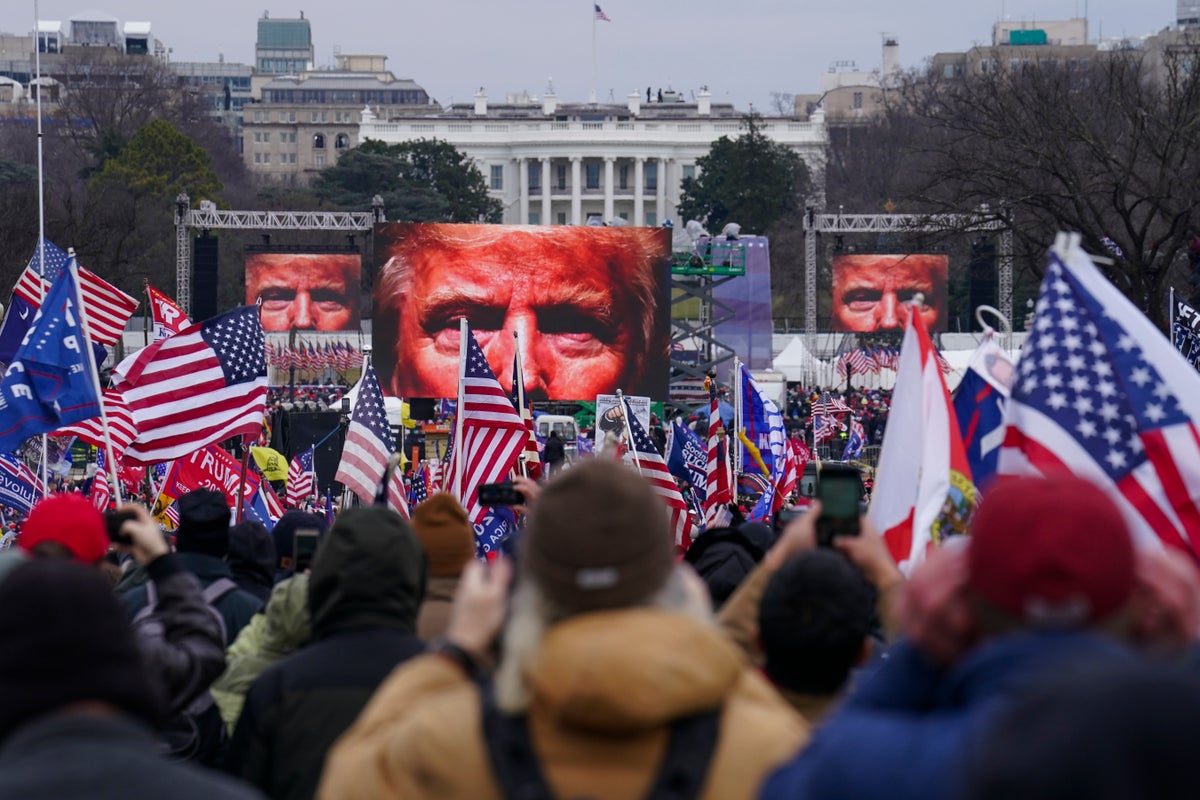
A late-night filing from lawyers for Donald Trump made one final written request to a federal appeals court to grant him “immunity” from charges stemming from his attempts to overturn the 2020 presidential election.
The 41-page filing is likely the last step before three-judge panel in Washington DC hears arguments from Mr Trump’s attorneys and federal prosecutors on 9 January before making a final decision on whether the former president is “immune” from prosecution for crimes committed while in office.
Mr Trump’s trial on conspiracy charges surrounding efforts to reverse his 2020 loss is scheduled for 4 March, but the case has effectively been put on hold while the former president appeals. The US Supreme Court declined to fast-track an appeal, letting the “immunity” question play out as scheduled at the appellate level.
Whatever the outcome of that decision, the “immunity” question is likely to land right back at the US Supreme Court in the weeks to come, in the middle of Mr Trump’s campaign for the Republican nomination for president.
The latest argument from Mr Trump’s attorneys cites a lengthy report he posted on Truth Social on Tuesday that revives debunked and unverified allegations of election fraud, relying on reports from fake, far-right and conspiracy theory-driven websites that have amplified Mr Trump’s narrative that the 2020 election was stolen from and rigged against him.
Lawyers revived familiar arguments, insisting that the case should be thrown out altogether, and that Mr Trump’s acquittal in his second impeachment for inciting the attacks on the US Capitol on January 6 means that he cannot be tried in court for similar crimes.
“Impeachment, not criminal prosecution, provides the principal check against alleged presidential malfeasance,” attorneys wrote in Wednesday’s brief.
His attorneys have long contended that Mr Trump’s actions constituted “official acts” under his presidency, and that prosecuting such actions now would compromise a “234-year unbroken tradition”.
“The likelihood of mushrooming politically motivated prosecutions, and future cycles of recrimination, are far more menacing and crippling to the presidency than the threat of civil liability,” they wrote.
“Therefore, the scope of criminal immunity has to be at least as broad as for civil immunity, i.e., the ‘outer perimeter’ of the president’s official responsibilities,” according to Mr Trump’s attorneys. “All five classes of conduct charged in the indictment fall within that broad scope.”
On 1 December, the federal judge overseeing the case ruled that Mr Trump’s one term in office did not bestow on him “the divine right of kings” to evade criminal accountability.
“The United States has only one Chief Executive at a time, and that position does not confer a lifelong ‘get-out-of-jail-free’ pass,’” wrote US District Judge Tanya Chutkan. “A former President’s exposure to federal criminal liability is essential to fulfilling our constitutional promise of equal justice under the law.”
A final filing from attorneys with special counsel Jack Smith’s office has urged the appeals court to reject Mr Trump’s “immunity” defence, arguing that no such claim exists in the Constitution or in case law, and that Mr Trump’s desperate attempts to cling to power did not constitute official presidential acts.
“For the first time in our nation’s history, a grand jury has charged a former President with committing crimes while in office to overturn an election that he lost. In response, the defendant claims that to protect the institution of the presidency, he must be cloaked with absolute immunity from criminal prosecution unless the House impeached and the Senate convicted him for the same conduct. He is wrong,” prosecutors wrote on 30 December.
“Separation-of- powers principles, constitutional text, history, and precedent all make clear that a former president may be prosecuted for criminal acts he committed while in office – including, most critically here, illegal acts to remain in power despite losing an election,” they added.
Mr Trump’s defence “implies that a president may use any means necessary to remain in power and evade federal criminal liability for his conduct unless first impeached and convicted,” according to the filing from Mr Smith’s team.
“And his invocation of double-jeopardy principles implies that a Senate acquittal of a former president because he is no longer in office forever insulates him from criminal accountability,” they added. “Those claims draw no support from our constitutional heritage and, if accepted, would damage bedrock principles of equality before the law. The court should affirm.”
The appeals court battle over his “immunity” claim is among a mountain of legal challenges facing the former president as he campaigns for the White House a third time.
Though the Supreme Court declined to hear Mr Smith’s request for its decision on the presidential “immunity” claim, the question is expected to return to the nation’s highest court. If the appeals court rules against Mr Trump, his team is likely to appeal. If Mr Smith’s argument is rejected, and Mr Trump’s “immunity” defence survives, prosecutors will likely ask the justices to weigh in.
The Supreme Court also is imminently expected to consider whether Mr Trump is even eligible for holding public office under the text of the 14th Amendment, which bars any person who has sworn an oath to uphold the Constitution and “engaged in insurrection or rebellion” from holding public office.
Colorado’s Republican Party has appealed a decision from Colorado Supreme Court justices to the high court, which is facing a request to keep his name on the state’s 2024 ballots.
The former president also has appealed a second state-level decision that finds him ineligible for the presidency to Maine’s superior court. The state’s top elections official determined last week that he is disqualified from ballots because of his actions during the Capitol attack on January 6.







